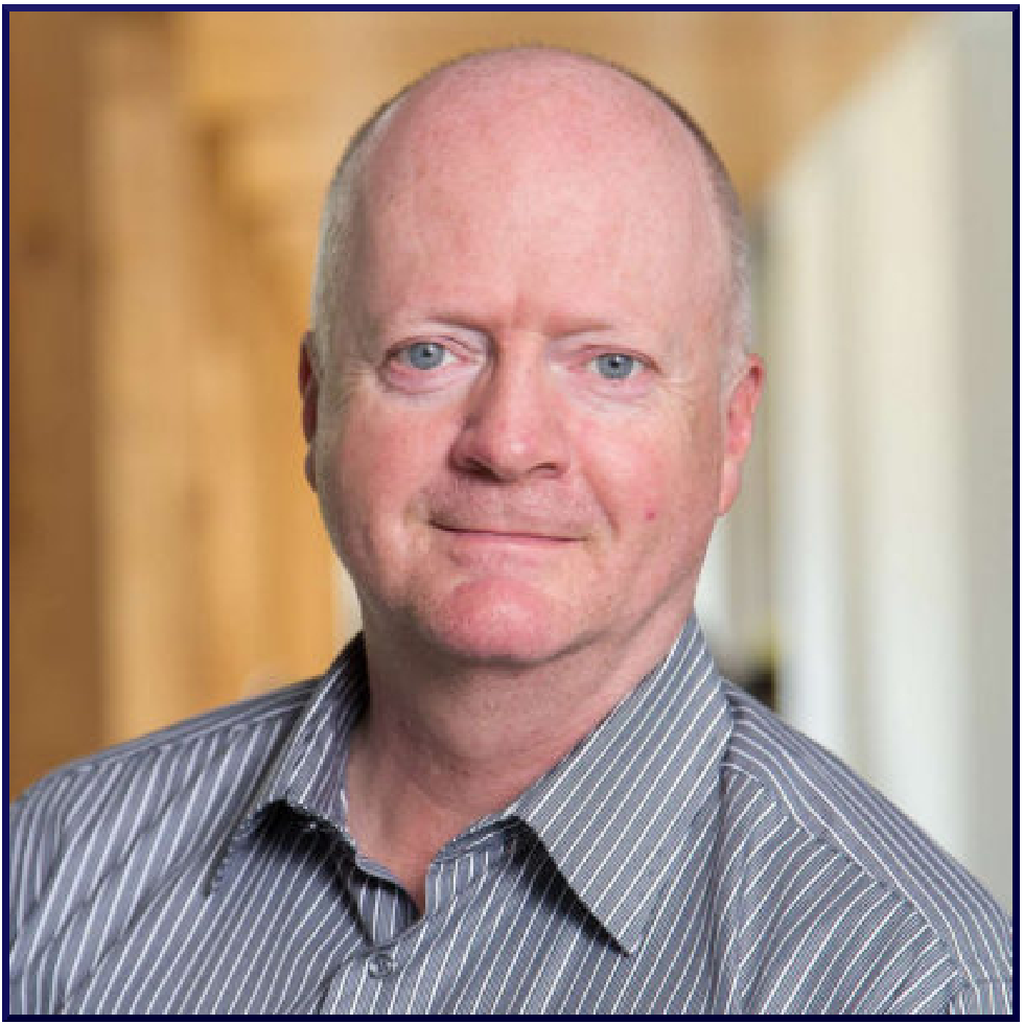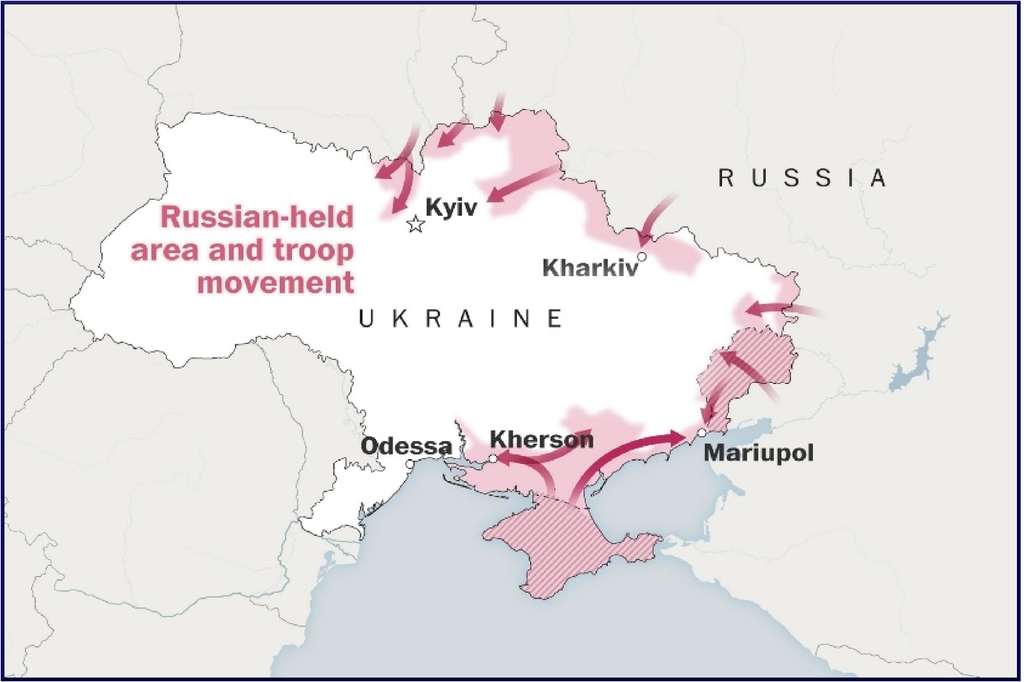Thoughts on the War in Ukraine: Guest Presentation by Prof. Alistair Edgar
by Gerry Schaus
As the world watched aghast at a month’s-long unprovoked Russian onslaught against Ukraine, the Retirees’ Association had a chance on March 25th to try to make sense of what we were witnessing. An audience of thirty of us gathered on Zoom and had the pleasure to listen to the well-informed thoughts of Professor Alistair Edgar, Political Science, WLU (with cross-appointment at the Balsillie School of International Affairs) about this deeply disturbing conflict.

Alistair Edgar
Prof. Edgar is an editor of Global Governance: A Review of Multilateralism and International Organizations and a series co-editor for the Academic Council on the United Nations System (ACUNS) Series on the United Nations. He served as Executive Director of ACUNS from 2003 to 2008 and from 2010 to 2018 and he is also president of the Canadian Landmine Foundation. Perhaps just as significantly, Prof. Edgar was a British Army officer trainee focusing on anti-tank battle strategy and tactics in the early 1980s, and after his undergraduate degree, he carried out graduate research with International Staff at NATO in the early post-Cold War years, 1989–91, when NATO-Russia Partnership, Partnership for Peace, and new Alliance membership processes were being discussed. In the mid-1990s he was running classes in Russian Foreign Policy at Moscow State University taking WLU students to Russia for overseas experience. He also worked in the Ural Mountain region of Russia from the late 1990s to the early 2000s with a Gorbachev Foundation project before new Russian rules under Putin closed down such “foreign funded” initiatives.
Prof. Edgar vehemently rejects any notion that NATO is at fault for the current situation. He himself was working with NATO at the time that the USSR collapsed and former Soviet allies wanted to join the North Atlantic Treaty Organization. At that early time there was no sense of victory or triumphalism in NATO about the collapse of the Soviet Union. In fact, there was a real puzzle as to what to do about these European countries, once subject to the USSR, who were turning to the West. The reason why these countries very quickly applied to join NATO was that they regarded it as the first step towards membership in the EU or at least gaining access to European markets. Alistair himself was asked to provide a report on what membership for Ukraine in NATO would mean, and his reply to NATO was “Not now, and probably not in the future.”

Map of Russian Invasion, March 25, 2022
Young Vladimir Putin was a lieutenant colonel in the KGB in the late years of the Soviet Union, serving 16 years as a foreign intelligence officer, but he was unheard of in the West until he threw his hat into the political arena. He has always been an ultra-nationalist. He served two terms as president from 2000 to 2008, then as premier from 2008 to 2012, when he manipulated the Russian Constitution to allow himself to serve further terms as president. It was Putin who launched the Second Chechen War where the Russian army reduced the capital city, Grozny, to rubble and atrocities were common. He also brought the might of the Russian army against Georgia by provoking a conflict on its northern borders and then battering it and taking a good chunk of it for Russia. This was because the Georgians were turning to the West. The Ukraine conflict is now unfolding the way the Georgia conflict did, according to Prof. Edgar, but there, in 2008, only about 260 people were killed. The same reasons, the same provocations, the same support for separatists within the country occurred, with a swift military “operation” planned, in order to settle Ukrainian politics in Russia’s favour.
Alistair also addressed the role of the United Nations in the current crisis in Ukraine. He emphasized that the UN is working on the ground to process the millions of displaced persons and give them support, while the UN’s World Health Organization is working with Ukraine to help provide food and medical supplies. UNICEF is also active in providing support to the children and displaced families in Ukraine. With open votes in the General Assembly of the UN, 140 countries have voted to condemn Russia’s attack on Ukraine while only five countries voted against the motion, including Russia, Cuba, Eritrea, Belarus, and North Korea. The International Court of Justice has already given a ruling that the invasion of Ukraine was illegal, even though Russia did not show up at the hearings to advocate against the ruling. There are also now investigations under way by the International Criminal Court regarding possible war crimes by Russia, which are another potential moral blow to Putin. Prof. Edgar, however, stressed that the imposition of sanctions on a country will not by themselves topple a regime—witness North Korea, but it may encourage internal dissent within Russia and perhaps at some point, lead to a replacement for Putin within Russia’s government.
The people who have fled Ukraine to EU countries are seeking refuge, but they are not yet “refugees” by definition, so the use of the term by the media is not correct as long as these displaced persons have not been granted official refugee status. Instead, they are being given temporary shelter within these EU countries, as an automatic one-year stay with Temporary Protective Status. A second-year extension is easily provided with the same status through EU mechanisms, while a third-year requires closer discussion.
In the Q & A session that followed Prof. Edgar’s talk, the audience had a chance to unburden itself. What is China’s reaction to the unprovoked invasion of sovereign Ukraine? What is a likely endpoint to this War? What is Putin’s internal opposition like within Russia? What is the position of the Russian Orthodox Church? How have other institutions within Russia, such as universities, reacted? Each of these questions was carefully addressed by Alistair drawing on a wealth of information and experience. China is an awkward position especially due to its designs on Taiwan, but likely won’t appreciably support Putin’s attack. The War may end with land concessions to Russia and Ukraine may promise not to join NATO, but Ukraine will insist on ironclad guarantees of its security this time. Putin is popular with many Russians because he brought stability and order to a chaotic country after the fall of the Soviet Union. The Russian Orthodox Church supports Putin since he supports the Church, even if Church leaders are not especially happy with the devastation in Ukraine. Six hundred university rectors in Russia came out with a statement supporting the special operation in Ukraine, although the military college that trains Russian officers was opposed to the operation before it began.
In the end, the audience was left much better informed about the War and happy to have benefitted from Alistair’s expertise, but still puzzled, frustrated, and probably angry that such a disaster could have happened to a peaceful democratic country on Europe’s borders.